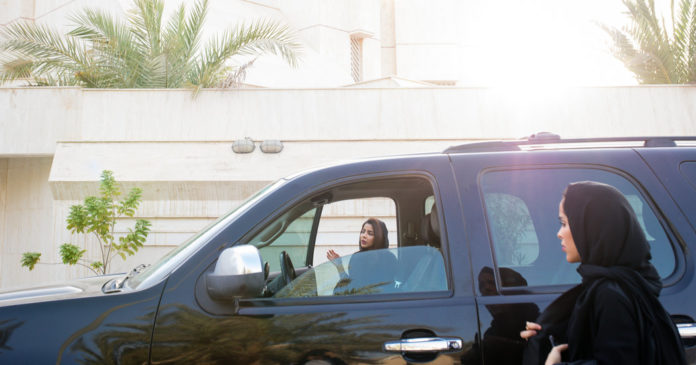JIDDA, Saudi Arabia — What if, for 40 years, government-run schools and mosques taught the same refrain — that women’s brains were smaller than men’s and couldn’t process complex information, that it was shameful for women to interact publicly with strangers, that sitting behind the wheel of a car could cause birth defects for a pregnant woman’s child?
And then, what if the government suddenly reversed itself?
The Saudi ruler announced nine months ago that he would grant women the legal right to drive. But many Saudis were still trying to process their new reality on Sunday, the first day that overturned what had been one of the most sacrosanct prohibitions in the absolute monarchy.
It’s unclear just how many Saudi women took to the streets to celebrate their new freedoms. The government announced that hundreds of women would have their licenses by Sunday. Bureaucratic delays have kept tens of thousands more from getting their permits in time for the historic day.
Still, many in this nation of 33 million were grappling with anxiety over this new freedom, both within families who never bought into the stereotype that women should be shut up at home, and those who sincerely believed what they had been taught since childhood.
In upper-middle-class families, where young women have gone abroad for school and have embraced the opportunities to work that are also relatively new in the kingdom, the apprehension is largely psychological.
Numerous young women in Riyadh and Jidda, the country’s two largest cities, have no plans to start driving, even though they have licenses from America or other countries where they have lived and studied.
The message they hear day after day at school is that girls are like candy — they need to be wrapped to protect their sweetness. Being on the streets, let alone being with strange men, means the removal of a layer of protection that had been ingrained in the minds of both genders.
So it’s not a surprise that young adults share a concern with their parents: What would happen if a young female driver were pulled over by a police officer? Would she be harassed, molested or worse?
“I wouldn’t want to make history as the first person in Saudi for that to happen to,” said Noura, 20, a chemistry student in Riyadh. “Men here have a very low mentality. I mean, think about how they’ve been taught for so long.”
Then there are practical reasons for not taking the wheel right away — if ever.
In Jidda, a port city on the Red Sea where potholes and sinkholes are so large that they are the subject of national jokes, a group of girlfriends in their 20s, who travel abroad and consider themselves politically liberal, said it would be a physical chore to navigate the poor roads each day.
Families on the other end of the socioeconomic spectrum — those struggling to make ends meet — say the choice to drive remains tantalizingly out of reach because they cannot afford it.
A 22-year-old unemployed man, Musallam al-Falih, who along with his cousin spent Saturday afternoon at a mall in Riyadh, said no women in his immediate family would start driving.
His family came to the capital a generation ago from their village, Al Khorma, where they lived off the land. As in any farming community, every pair of hands was necessary for daily life. Women there drove out of necessity, and the local police, who were their cousins or in-laws, looked the other way.
In their current lives in the Saudi capital, though, where money is tight and free time is scarce, driving doesn’t make much sense for women in his family. Driver’s education, which is necessary before getting a license, costs almost 3,000 riyals, or about $800, the average salary of a starting teacher.
“Who has the money?” Mr. Falih asked.
The current generation of Saudis has grown up in a time when previous rulers empowered clerics who have taught a rigidly pious stream of Islam known as Wahhabism, which is not practiced widely in other Arab or Islamic countries.
While those places have long accepted women in prominent roles in politics, business and society, many Saudis have not.
Another aspect of this stream of Islam is the belief that Saudi citizens must give absolute obedience to their ruler and not question authority.
The Saudi ruler and his son, Crown Prince Mohammed bin Salman, are banking on this mind-set to help catalyze support for and acceptance of their new decrees despite their radical disconnect from the laws of the recent past. Other changes introduced in the last year are the right to play music in public and gender desegregation at sporting events and entertainment venues.
Abdullah, a taxi driver in Riyadh, wears a thobe, the long white male garment, and a headdress in the styles favored by religious conservatives. He said he would accept the new law allowing women to drive because it had been introduced by the king. But he said he wasn’t going to give permission for the women in his life to drive, nor would they want him to.
“What our authority says, I will obey,” he said, adding: “I’m happy for others to have this choice. But our lives were just fine the way they were.”
Source : Nytimes













